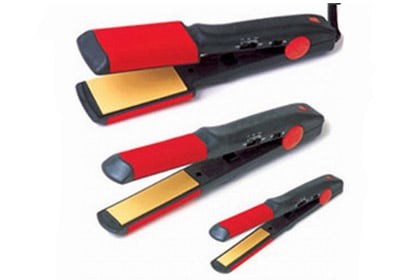 Tip 1: Pick the right size flat iron
Tip 1: Pick the right size flat iron
Flat irons are like clothes, they are not one-size fits all. The length and thickness of your hair should determine the size of your iron, says Moticka. The right size iron will be easier to maneuver, straighten your hair more efficiently, and decrease the risk of overheating and damaging hair.
For short, thick or fine hair: Use an iron with narrow plates ranging in size from half-an-inch to one-inch thick. This will allow you to iron smaller sections.
For short, thick or fine hair: Use an iron with narrow plates ranging in size from half-an-inch to one-inch thick. This will allow you to iron smaller sections.
For long, thick or fine hair: Use an iron with wider plates ranging in size from one-and-a-half inches to two-inches wide so you're able to cover more surface area in less time,. Also, be weary of the weight of your iron. Anything super heavy (more than two pounds) will have your arm hurting in no time. Straightening hair shouldn't be equivalent to weight training.
Tip 2: Select the right heat setting
 Your hair texture and type should determine your heat setting. Most professionals use an iron with variable heat settings, but a drugstore iron (if you are on a tight budget) will work on some hair types as they are set to a "higher, workable temperature" and if the "density of your hair is average, than you should be OK.If you do have the ability to purchase an iron with a variable heat setting, then do so. The more your iron caters to your specific hair needs, the less likely you will be to damage your hair.
Your hair texture and type should determine your heat setting. Most professionals use an iron with variable heat settings, but a drugstore iron (if you are on a tight budget) will work on some hair types as they are set to a "higher, workable temperature" and if the "density of your hair is average, than you should be OK.If you do have the ability to purchase an iron with a variable heat setting, then do so. The more your iron caters to your specific hair needs, the less likely you will be to damage your hair. For fine or damaged hair: 250-300 degrees
For medium/average hair: 300-350 degrees
For thick or coarse hair: 350-400 degrees
Tip 3: Use the right material
Look for flat irons that use ceramic, tourmaline or titanium metals. They will heat more evenly causing less heat damage to your hair.They are the "gentlest on the hair" because they release negative ions which work to tighten the hair's cuticle. This produces a shinier, healthier, less frizzy look and feel, . On the flip side, be weary of "irons that are ceramic 'coated' or Teflon 'coated" as they will heat a little more unevenly, and tend to have a more drying effect."
No comments:
Post a Comment